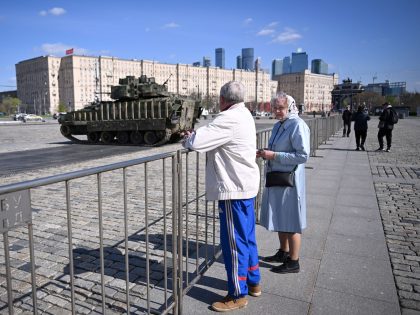
The Crisis That Created Putin
Twenty years ago, a crisis of Russian capitalism doomed Moscow’s pro-Western regime and gave birth to the Putin era.

Twenty years ago, a crisis of Russian capitalism doomed Moscow’s pro-Western regime and gave birth to the Putin era.

A series of Saudi snubs against Joe Biden — including its latest move to cut world oil production — could finally accomplish what has been stubbornly hard up to now: ending the US backing of the Saudis’ brutal war against Yemen.

Use of the US’s unprecedented weapons supply to Ukraine has not been properly tracked by the Department of Defense — and the country has a history of alleged misuse, loss, or selling of munitions.

This week, 27 foreign policy experts called for a no-fly zone in Ukraine that would lead to the shooting down of Russian planes — an idea that could lead to a nuclear holocaust. Their message is being bankrolled by arms manufacturers and fossil fuel interests.

The pandemic and the war in Ukraine have shaken many of the European Union’s dogmas. Yet the EU has repeatedly defied predictions of imminent collapse — posing the need for a serious left-wing program to reform it.

When he became the last Soviet leader, Mikhail Gorbachev wanted to democratize the USSR without embracing free-market capitalism and end the Cold War without enabling US domination. The world is still haunted by his inability to achieve those goals.

Russian-speaking Ukrainians are among the main victims of Vladimir Putin’s invasion, and many have served in the Ukrainian army. The call to “decolonize” Ukraine by banishing Russian ignores this, imposing a vision of narrow cultural homogeneity.

Communists who came to the Soviet Union seeking refuge found themselves caught up in the madness of the Stalinist purges. But many, argued Isaac Deutscher, still couldn’t think of breaking with the system that Stalin created and ended up working for their former persecutors.

Lenin remained true to the tactical guidelines of Karl Kautsky after the latter had abandoned them.

One hundred years after Russia's February Revolution, we answer your questions about the historic rebellion.

We can oppose US intervention, while telling the truth about Assad’s chemical weapons use.

The Dayton Agreement ended the bloody Bosnian War of the 1990s, but it hasn’t resolved the conflicts plaguing the country. It’s a cautionary tale for finding an effective peace agreement in Ukraine.

During the Cold War, Yugoslav socialist Tito tried to chart a course apart from the Soviets. But his actions enraged Stalin — putting Tito on the unlikely path of seeking Western support and revealing the difficulties of nonalignment amid great power politics.

After the Cold War, ideologues declared capitalism victorious. But war and far-right parties have once again returned to the continent. The root of this disorder lies in the neoliberalism of the 1990s and the defeat of the Left.

Responses to the expansion of BRICS ping-ponged from dismissal to fearmongering. But there’s not much reason to fear for the US-led world order quite yet — and we shouldn’t fear the multipolar one BRICS wants to build.

Since 1945, Finland has sought cordial relations with its vast Russian neighbor. But Vladimir Putin’s war on Ukraine has emboldened champions of Finnish NATO membership — and made things harder for left-wing critics of the military alliance.

For a brief period after World War II, Third World nations played an active role in shaping the world economic order and fostering development. For all its promises and a few success stories, neoliberalism hasn’t done the same.

Russia’s invasion of Ukraine has revealed the new reality of great-power conflict, underwritten by nuclear weapons. Our task is to reject aligning with one of the great powers and to instead push for across-the-board nuclear disarmament.

Last week, renowned investigative reporter Seymour Hersh published an article claiming that the US was responsible for the destruction of the Nord Stream pipeline transporting natural gas to Germany from Russia. He spoke to Jacobin about the allegations.

Sociologist Boris Kagarlitsky, a prominent Russian Marxist, has been detained by Vladimir Putin’s FSB on fabricated charges of “justifying terrorism.” His arrest shows how the Russian state is silencing critics of its war.